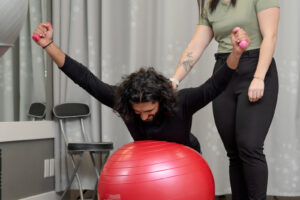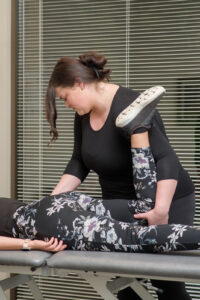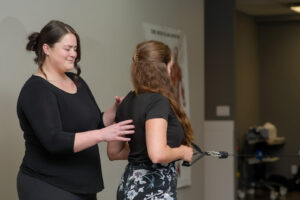For anyone involved in sports or fitness or undergoing rehabilitation for an injury, it’s crucial to know about the various treatment options available to help with recovery and injury prevention. Athletic Therapy and Kinesiology are two fields often mentioned in the same breath. Still, they each offer unique benefits and approaches to rehabilitation. If you’re wondering which path to take for optimum recovery, you’re not alone. This blog post aims to explain each practice and aid you in making an informed decision for your healthcare needs.

What is Athletic Therapy?
Athletic Therapy treats acute and chronic muscle, bone, and joint injuries. Certified athletic therapists receive training in the prevention, emergency care, assessment, and rehabilitation of musculoskeletal injuries. They use various techniques – including manual therapies, therapeutic modalities, corrective exercises, physical reconditioning, taping, and bracing – all geared towards a speedy and safe return to activity, whether for everyday functioning or competitive sports.
You might spot athletic therapists attending to injuries on the sidelines at sports games, ready to provide emergency care. Their expertly honed skills make them vital in professional sports teams where quick and decisive action can make all the difference.

What about Kinesiology?
Kinesiology takes a bird’s-eye view of body movement. This science examines exercise, human movement, and how physical activity affects overall health and wellness. Rather than focusing on injury treatment, kinesiologists usually provide movement analysis and physical ability assessments. They promote active lifestyles and injury prevention through carefully designed exercise programs.
Kinesiologists work in various settings, including clinics, fitness centers, corporations for workplace health, and research. They contribute significant insights into how people can harness movement and exercise to enhance well-being.

Comparing Education and Certification
To become a certified athletic therapist, candidates must complete a dedicated Bachelor’s Degree program with at least 1200 hours of practical training in diverse settings and pass a rigorous certification exam. Kinesiologists generally require a Bachelor’s Degree in Kinesiology or a closely related field but do not have the same focused training specifically for injury assessment and rehabilitation.
Insurance Considerations
Before choosing your therapy path, it’s essential to consider insurance coverage. Insurance plans may not cover Athletic therapy and kinesiology services, so check what your policy allows for. ICBC funds both, but a Physio-Directed Active Rehab Program could be a viable alternative if you’re dealing with an injury not covered by accident insurance, and you don’t have coverage under your extended benefits.
Such programs, typically involving an Athletic Therapist or Kinesiologist overseen by a Physiotherapist, may be billable under physiotherapy benefits, meaning more likelihood of coverage by insurance providers like Manulife, Canada Life, Sunlife or Pacific Blue Cross.

Kinesiology or Athletic Therapy: Making the Right Choice for You
The right choice between Athletic Therapy and Kinesiology depends on your specific needs and goals. An Athletic Therapist could be your best choice if you focus on expertly navigating the road from injury to activity with precision. Conversely, suppose you want to enhance your movement, build strength, and foster recovery through regular physical activity. In that case, kinesiology might be the way to go.
The bottom line comes down to compatibility. Ensuring that your therapist has the requisite qualifications, experience, and an approachable personality is as important as their professional capabilities. Trust, comfort, and confidence in your therapist’s expertise are non-negotiable in your recovery journey.
—
This post aims to clarify the distinctions between Athletic Therapy and Kinesiology, offering insight to athletes, fitness enthusiasts, and patients alike for better-informed health and recovery choices.
If you have questions or need personalized guidance, don’t hesitate to contact our clinic or book with one of our healthcare professionals, who can provide tailored advice based on your unique situation and goals.
Written by: DeVera Nybo, MBA, CEO/Owner, Newleaf Total Wellness Centre.
